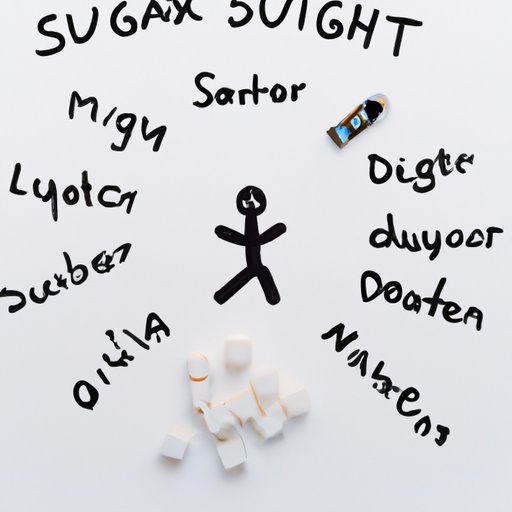Introduction
Sugar is everywhere, but too much of it can be bad for your health. Eating too much sugar can lead to tooth decay, weight gain, and an increased risk of developing type 2 diabetes and other chronic diseases. For those who have become addicted to sugar, breaking the habit can be difficult. This article will provide eight tips to help you stop eating sugar and make healthier choices.
Identify Your Triggers
The first step in breaking a sugar addiction is to identify when and why you reach for sugary foods. Is it simply because they are available, or do you reach for them when you’re feeling stressed or anxious? Once you have identified the triggers that lead you to eat sugary foods, you can begin to develop strategies to avoid these triggers.
For example, if you find yourself reaching for sugary snacks when you’re feeling stressed, try taking a walk or doing another activity to help alleviate the stress. If you tend to eat sweets when they’re available, try to keep them out of sight and out of mind by storing them in a cupboard or pantry that is not easily accessible.
Choose Healthier Alternatives
Once you have identified your triggers and developed strategies to avoid them, it is important to replace sugary snacks with healthier alternatives. Some healthy snack options include nuts, seeds, fruit, yogurt, hummus, and vegetables. Not only are these snacks lower in sugar and calories, but they also provide vital nutrients like fiber and protein that can help keep you full and satisfied.
In addition to providing essential nutrients, eating healthier snacks can also help reduce cravings for sugary foods. According to a study published in the Journal of Nutrition, people who ate a snack that was high in protein and fiber were less likely to crave sugary snacks than those who ate a snack that was low in both nutrients.
Practice Mindful Eating
Mindful eating is a practice that involves being aware of your thoughts, feelings, and physical sensations as you eat. It involves paying attention to the taste and texture of food, savoring each bite, and avoiding distractions such as television or phones while eating. Practicing mindful eating can help you become more aware of your hunger and fullness cues, which can help you make healthier food choices.
To practice mindful eating, start by focusing on one bite at a time. Notice the smell, taste, and texture of the food. Chew slowly and pay attention to how full you feel after each bite. If you get distracted, take a few deep breaths and refocus on the food in front of you.
Get Enough Sleep
Getting enough quality sleep is essential for overall health and well-being. Studies have shown that inadequate sleep can lead to higher levels of the hormone ghrelin, which is responsible for triggering hunger. In addition, lack of sleep can lead to fatigue and decreased energy, which can make it harder to resist cravings for sugary foods.
To ensure you get adequate sleep, aim for 7–9 hours per night. To help improve your quality of sleep, create a consistent sleep schedule and stick to it, avoid caffeine late in the day, and limit screen time before bed.
Exercise Regularly
Regular exercise is an important part of any healthy lifestyle. Exercise can help reduce stress, boost mood, and increase energy levels, all of which can help reduce cravings for sugary foods. In addition, research has shown that regular physical activity can help regulate appetite hormones and reduce body fat, both of which can help reduce cravings for sugary foods.
If you’re new to exercise, start slowly and gradually increase the intensity and duration of your workouts. Aim for 30 minutes of moderate-intensity exercise most days of the week. Examples of moderate-intensity exercises include walking, jogging, cycling, and swimming.
Drink More Water
Drinking plenty of water is important for overall health and can also help reduce cravings for sugary foods. When you’re feeling hungry, drink a glass of water and wait a few minutes. Often, thirst can be mistaken for hunger, so drinking water can help satisfy your thirst and reduce cravings for sugary snacks.
In addition, studies have shown that drinking water before meals can help reduce overall calorie intake and promote weight loss. To increase your water intake, carry a water bottle with you throughout the day and aim to drink 8–10 glasses of water per day.
Conclusion
Breaking a sugar addiction can be challenging, but with the right strategies, it is possible. Start by identifying your triggers and developing strategies to avoid them. Replace sugary snacks with healthier alternatives, practice mindful eating, get enough sleep, exercise regularly, and drink more water. With dedication and effort, you can break your sugar addiction and make healthier choices.
(Note: Is this article not meeting your expectations? Do you have knowledge or insights to share? Unlock new opportunities and expand your reach by joining our authors team. Click Registration to join us and share your expertise with our readers.)
